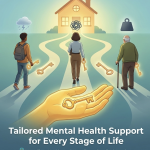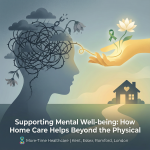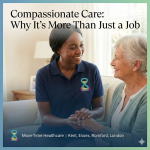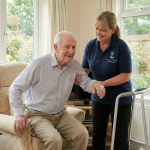Post-Surgery Home Care: What Families Should Know
Estimated Reading Time: 5 minutes
- Post-surgery recovery is an ongoing process.
- Proper home care improves recovery outcomes.
- Emotional support is crucial during the healing journey.
- Professional help may be necessary for certain complications.
- More-Time Healthcare offers tailored support for families.
- Introduction
- Why Recovery Continues Beyond Hospital Discharge
- Essential Elements of Home Care
- Preparing the Home Environment
- Preventing and Spotting Complications
- When to Seek Professional Help
- Emotional Perspective and Support
- How More-Time Healthcare Can Support You
- Closing Invitation
Why Recovery Continues Beyond Hospital Discharge
Discharge from hospital marks a transition, not the end, of recovery. The body requires time and support to heal, with many health professionals highlighting that proper home care can significantly improve outcomes and reduce complications. Sources such as the NHS detail the importance of adequate post-operative care, indicating that insufficient care may lead to delayed recovery or even readmission to the hospital. This ensures that practical steps such as wound management and gradual mobility support are essential to regaining independence.
Essential Elements of Home Care
Wound Care
Caring for surgical wounds properly is vital to preventing infection and promoting healing. Patients must keep wounds clean and dry, change dressings as instructed, and watch for signs of trouble such as increased redness, pain, swelling, or discolouration. Resources from the NHS and other healthcare providers detail best practices for wound care which can help families feel empowered in managing post-surgical recovery.
Mobility Support
After surgery, even daily movements can pose challenges. Physiotherapists often provide exercises to perform at home, but gentle help from family or trained carers ensures both safety and dignity during recovery. Expert guidance can aid patients in regaining strength and mobility, nurturing their independence step by step.
Medication Management
Strict routines are essential to avoid missed doses or adverse reactions. Families should prepare a medication timetable, using alarms or pill organisers where helpful. Engaging healthcare professionals regarding potential side effects or drug interactions can also mitigate risks associated with medication management.
Emotional Reassurance
Recovery is as much emotional as it is physical. Patients may experience feelings of vulnerability, anxiety, or frustration. Providing emotional support, patience, and encouragement can nurture well-being and significantly speed up recovery. A compassionate approach helps create an environment where patients feel safe and cared for.
Preparing the Home Environment
Before your loved one comes home, it is crucial to prepare the house for their return:
- Create Accessibility: Remove trip hazards, arrange sleeping spaces on the ground floor if necessary, and ensure bathrooms are equipped safely for mobility.
- Maintain Hygiene: Practising good handwashing, regular cleaning, and ensuring fresh wound dressings are available can reduce the risk of infection.
- Plan Meals and Comforts: Stock nutritious and easy-to-digest foods, and structure the living space for comfort and accessibility.
Proactive preparation—both physical and psychological—significantly lowers the risks of complications and eases family anxiety.
Preventing and Spotting Complications
It’s vital to monitor for any unusual signs during recovery, such as:
- Fever or chills
- Unusual wound discharge, redness, or swelling
- Persistent pain unmanageable by medication
- Difficulty breathing or swelling in limbs
- Changes in alertness or confusion
Families should engage with the medical team to discuss which signs warrant urgent action, and they should not hesitate to seek professional advice—early intervention can prevent serious issues.
When to Seek Professional Help
While many families provide capable care, sometimes skilled nurses are needed for wound checks, medication management, physiotherapy, or emotional support. Signs that professional assistance is warranted may include a slow recovery, worsening symptoms, or increased emotional distress.
More-Time Healthcare stands ready to offer tailored support. Our trained nurses and carers are equipped to assess individual needs and provide assistance while respecting family wishes.
Emotional Perspective and Support
Families often feel overwhelmed during the post-surgical recovery stage. It’s important to remember that needing support—both practical and emotional—is entirely normal. With expertise and a calm presence, caregivers from More-Time Healthcare work alongside families to navigate this challenging time, offering reassurance and compassion.
How More-Time Healthcare Can Support You
More-Time Healthcare’s local nurses and carers provide empathetic, knowledgeable, and flexible care. Whether for short daily visits or round-the-clock assistance, we ensure recovery plans are followed meticulously, comfort and safety are maximised, and families are kept informed every step of the way.
Closing Invitation
For further guidance or a free, friendly consultation, please contact More-Time Healthcare. Our experienced team is committed to helping families navigate every stage of post-surgery home care with confidence and compassion.
Home Care for Stroke Recovery
Estimated Reading Time: 5 minutes
- Stroke recovery includes physical, cognitive, and emotional challenges.
- Personalised home-care routines enhance recovery outcomes.
- Creating a safe home environment supports healing.
- Expert care offers both practical support and emotional reassurance.
- More-Time Healthcare is dedicated to family-centered care.
- Introduction
- Challenges After a Stroke
- Personalised Home-Care Routines
- Creating a Safe and Positive Recovery Environment
- Rehabilitation Monitoring
- The Value of Expert Care and Emotional Reassurance
- How More-Time Healthcare Assists
- Closing Invitation
Introduction
Experiencing a stroke is a life-changing event that deeply affects not only the body but also the mind and emotions. For many, returning home after hospital discharge is the beginning of a new chapter focused on rebuilding independence. More-Time Healthcare is dedicated to providing steadfast support and gentle reassurance for families and stroke survivors throughout this crucial recovery journey.
Challenges After a Stroke
Stroke recovery is multifaceted, as survivors often face several interconnected hurdles:
- Physical Challenges: Weakness, poor coordination, and paralysis are common. Everyday tasks such as walking, eating, or even dressing may require assistance.
- Cognitive Challenges: Many survivors experience changes in memory, language, and attention. Communication difficulties and confusion may arise, making the ability to engage with loved ones challenging.
- Emotional Challenges: Frustration, low mood, and anxiety are frequent emotional responses. The sense of loss—of mobility, communication, or confidence—can feel overwhelming, making professional support invaluable.
A holistic approach is necessary to effectively navigate the complexities of stroke recovery, addressing the body, the mind, and emotional health.
Personalised Home-Care Routines
Consistency and familiarity are central to healing after a stroke. Home care allows survivors to recover in their own environment, surrounded by family and familiar comforts. Personalised at-home routines—such as daily schedules, adapted nutrition, and tailored exercises—help build a structure that encourages safety and fosters progress.
Essential components of home care include:
- Physiotherapy: Guided exercises help rebuild strength and mobility, tailored to each individual’s recovery needs.
- Speech and Language Therapy: Regular support assists in recovering communication skills and boosting confidence in interactions.
- Daily Living Assistance: Trained carers can help with essential tasks such as bathing, dressing, meal preparation, and mobility, allowing survivors to maintain their dignity and independence.
At More-Time Healthcare, our nurses and carers collaborate closely with families and therapy teams, ensuring a seamless continuum of care that prioritises the patient’s comfort and progress.
Creating a Safe and Positive Recovery Environment
Families can take several steps to foster a safe and supportive home for stroke recovery:
- Remove clutter and trip hazards.
- Install grab rails in bathrooms and staircases.
- Use clear communication and maintain patience, allowing time for responses.
- Encourage family members to celebrate progress, no matter how small, to foster emotional resilience.
Creating an encouraging environment helps stroke survivors regain confidence while also acknowledging that recovery may be a slow and steady process.
Rehabilitation Monitoring
Continual assessment of progress is vital. More-Time Healthcare professionals can help monitor both physical and cognitive improvements, track medication compliance, and address any setbacks quickly. Our caregivers communicate regularly with therapists and doctors, ensuring everyone remains informed and involved in the recovery process.
The Value of Expert Care and Emotional Reassurance
Facing recovery alone can heighten feelings of isolation and frustration. At More-Time Healthcare, our trained nurses and carers provide not only practical support, but also understanding and encouragement. With years of experience, our team is committed to working alongside families to achieve the best possible outcomes and emotional comfort.
How More-Time Healthcare Assists
Our flexible support options—whether for just a few hours each day or on a live-in basis—allow us to adapt to the changing needs of stroke survivors. By combining reliable rehabilitation practices with genuine companionship, we enable families to feel empowered through the recovery journey.
Closing Invitation
If you are caring for a loved one after a stroke and seek trustworthy advice or a free consultation, More-Time Healthcare stands ready to assist. Reach out to us today and let our experienced nurses and carers support your family’s recovery with care and compassion.
Hospice vs. Palliative Care: What’s the Difference?
Estimated Reading Time: 5 minutes
- Understanding the differences between hospice and palliative care is essential.
- Both types focus on quality of life but cater to different stages of illness.
- Care plans are personalised to meet individual patient needs.
- Support for families is a crucial element of both care types.
- More-Time Healthcare is here to assist families in navigating these options.
- Introduction
- Definitions in Plain English
- When Is Each Type of Care Appropriate?
- What Can Families Expect?
- Focus on Quality, Comfort, and Understanding
- More-Time Healthcare’s Compassionate Approach
- Closing Invitation
Introduction
When navigating the complexities of serious illness, families often encounter terms like hospice and palliative care. Understanding the nuances between these two types of care is essential for making informed and compassionate healthcare decisions. At More-Time Healthcare, we believe in providing families with the clarity and reassurance they need during these intimate journeys.
Definitions in Plain English
- Palliative Care: This form of care focuses on alleviating symptoms, pain, and distress for individuals living with serious illnesses. Importantly, it can be provided at any stage of an illness—whether alongside curative treatment or during the latter stages. Its primary goal is to enhance the quality of life.
- Hospice Care: A specific type of palliative care intended for patients nearing the end of life, typically when curative treatments are no longer pursued. Hospice care prioritises comfort, dignity, and comprehensive emotional support for both patients and their families.
At the heart of both approaches lies a commitment to the individual’s wishes, rather than a sole focus on the illness itself.
When Is Each Type of Care Appropriate?
- Palliative Care: Can be initiated at any point during a serious illness—such as cancer, organ failure, or neurodegenerative conditions—offering symptom management and emotional support throughout the treatment process.
- Hospice Care: Typically considered when medical professionals believe that a patient is in the last months of life. The focus shifts from aggressive treatment to enriching quality of life and facilitating a peaceful environment.
Both forms of care can be delivered in various settings, including homes, hospitals, or specialised facilities. More-Time Healthcare ensures that families remain involved and respected throughout every step of this healthcare journey.
What Can Families Expect?
Families seeking hospice or palliative care should anticipate numerous supportive services, including:
- Personalised Care Plans: Developed in collaboration with the medical team to respect individual preferences and wishes.
- Symptom Management: Continuous monitoring and management of pain, facilitating comfort for both patients and their loved ones.
- Emotional and Spiritual Support: Offering compassionate companionship, access to counselling, and resources to navigate emotional challenges.
- Family Involvement: Promoting open communication and guidance for family members, ensuring they feel supported during this difficult time.
Highly skilled healthcare professionals at More-Time Healthcare, including nurses and carers, are prepared to provide around-the-clock assistance tailored to each situation.
Focus on Quality, Comfort, and Understanding
Quality of life remains central to both hospice and palliative care. Addressing emotional, spiritual, and environmental needs—through the kindness of words, familiar music, or simple gestures like holding hands—ensures that care is delivered with empathy and respect. More-Time Healthcare’s team is dedicated to providing compassionate support while guiding families through difficult decisions and emotional processing, gently and honestly.
More-Time Healthcare’s Compassionate Approach
Our experienced carers and nurses deliver sensitive hospice and palliative care with dignity and respect. Supporting physical needs and emotional wellbeing, we work closely with NHS colleagues and local specialists to ensure seamless, holistic care in the comfort of home.
Closing Invitation
If you have any questions regarding palliative or hospice care, or if you wish to discuss your family’s situation confidentially, please contact More-Time Healthcare today. Our dedicated team is here to listen, guide, and support you and your family with dignity through every step of this journey.










